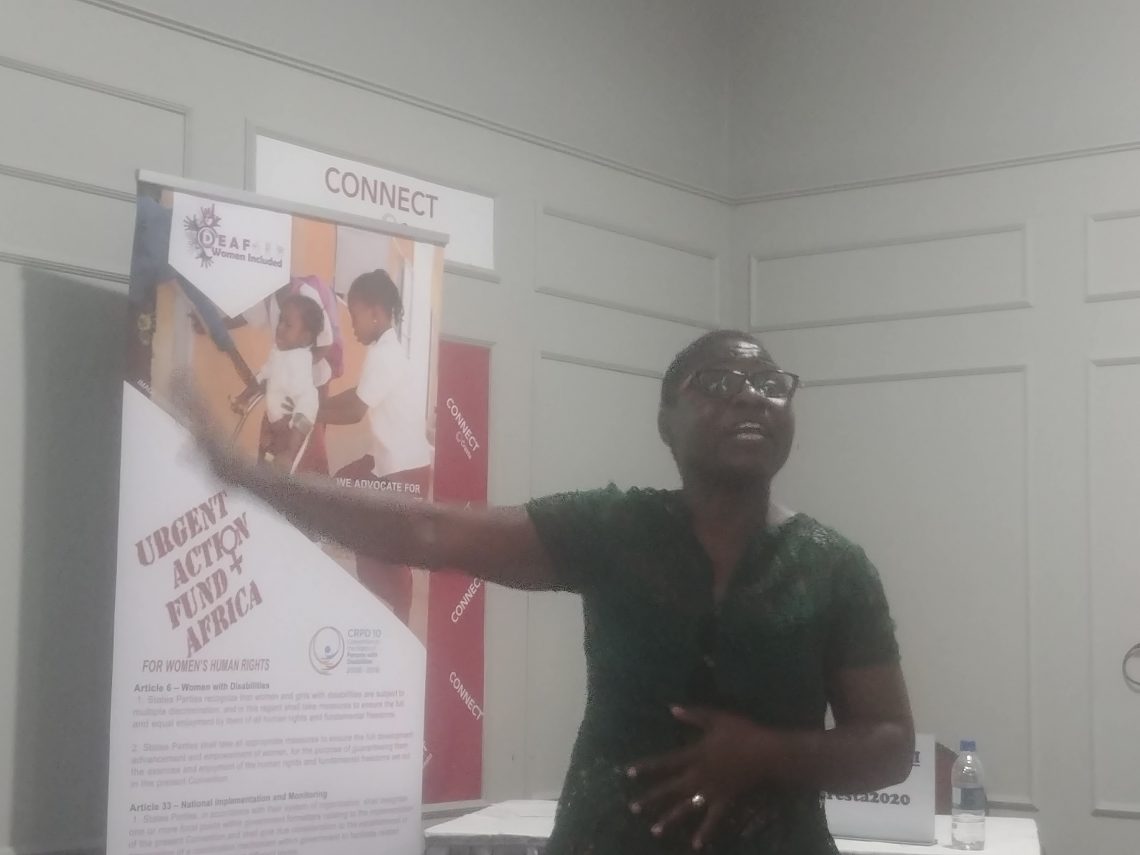By Byron Mutingwende
Deaf Women Included feels it is compelled to petition the government to domesticate the United Nations Convention on the Rights of Persons with Disabilities (UNCRPD) that was ratified by the Government of Zimbabwe in 2013.
In her address during a policy dialogue meeting on the domestication process of the Convention on the Rights of Persons with Disabilities in Zimbabwe, Agnes Chindimba, the Executive Director of Deaf Women Included called on stakeholders to collaborate with her organisation and sign a petition to be taken to Parliament.
The Convention is intended as a human rights instrument, which adopts a broad categorization of persons with disabilities and reaffirms that all persons with all types of disabilities must enjoy all human rights and fundamental freedoms. It clarifies and qualifies how all categories of rights apply to persons with disabilities and identifies areas where adaptations have to be made for persons with disabilities to effectively exercise their rights.
“In 2013, Zimbabwe signed and ratified the UNCRPD committing to the respect, protection and uplifting of the rights of persons with disabilities in Zimbabwe. During the interface meeting held on the 21st of June 2018 with leaders of the Disabled Persons Organisations, the President of Zimbabwe, his Excellency President Emmerson Mnangagwa committed to the domestication of the Convention as had been presented by the delegates of disabled persons organisations (DPOs).
“In addition, during the Global Disability Summit that took place in London from the 23rd to the 24th of July 2018 the Ministry of Labor and Social Welfare signed YES to the Summit Charter and specifically committed to the domestication of the Convention. In their own words, the Ministry wrote “…Zimbabwe undertakes to domesticate the United Nations Convention on the Rights of Persons with Disabilities and to expedite the formulation of a policy framework for PWDs…” but up to now the convention has not been domesticated hence the urgent need of the petition,” Chindimba said.
Senator Rejoice Timire who represents persons with disabilities in Parliament said it is imperative to domesticate the UNCRPD since it gives PWDs the opportunity to enjoy their full rights like everyone else.
“The domestication of the UNCRPD makes society understand the situation of PWDs better so as to afford them the right to education and other health, among others, that they are often excluded from. When domesticated, the government should set aside a Budget to fully implement it. In the meantime, non-governmental organisations can come up with a UNCRPD report to complement that of the government,” Senator Timire said.
Disability activist, Nasper Manyau urged stakeholders to use social media to amplify the voices of PWDs not only in Zimbabwe but globally.
“If our plea goes global, we might have an impact. If we fail to achieve what we want, we should mobilise all persons with disabilities to demonstrate and petition. All government schools should be compelled to teach sign language to foster inclusivity.
“We hear government is creating a post for Chamisa but is not doing anything to implement the UNCRPD yet as Deaf Women Included we have been making noise and probing the government for over five months now,” Manyau said.
Zimbabwe Open University Associate Professor (Disability Studies and Special Needs Education) Lincoln Hlatshwayo, in a speech read on his behalf, said the UNCRPD is a useless document when it is not domesticated. On 23 September 2013, Zimbabwe ratified the UNCRPD but five years down the line it has not been domesticated.
“The government has loads of conventions that it is a part of but it becomes useless to have great policies in place without domesticating them. Persons with disabilities are often excluded from accessing basic services like housing,” he said.
Zimbabwe’s local laws say 5% of national housing should be reserved for persons with disabilities but it is often hard for PWDs to be put on the housing waiting laws yet according to statistics, there are 1, 2 million people with disabilities in Zimbabwe.
“If and if we leave out the PWDs constituency, we won’t develop as a nation. PWDs have a right to education, good health and so forth but we must bear in mind that rights come with responsibilities. When we domesticate the UNCRPD, we can compel the government to meet its obligations,” he said.






